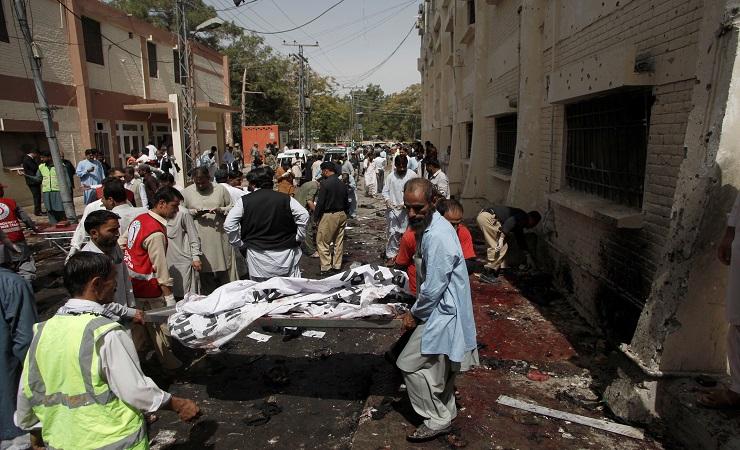ASIACALLING
The murky geopolitics behind a deadly attack in Pakistan
"Dozens were killed in the worst attack on Pakistan’s community of lawyers earlier this month. Behind the scenes is a complicated geopolitical dynamic involving Pakistan, India, Afghanistan and China."

Dozens were killed in the worst attack on Pakistan’s community of lawyers earlier this month.
A suicide bomber targeted a group of mourning lawyers at a government hospital in Quetta – a hot bed of criminal, ethnic and sectarian violence.
But behind the scenes of the attack there is a complicated geopolitical dynamic involving Pakistan, India, Afghanistan, and a $46 billion mega energy and infrastructure project with China.
Naeem Sahoutara has this report.
Human rights lawyer Attaullah Langho is seated here in the corridor of the Agha Khan University Hospital in the city of Karachi, where many of his colleagues are being treated.
They were injured in a bomb blast that targeted the legal community in the southwestern city of Quetta on August 8th.
Langho says that many of his friends were killed in the attack.
“Everyone was panicked, there was chaos and people ran away. So, we started collecting the bodies of our colleagues. This was an inhumane act. This is an injustice with our community,” Langho says.
Earlier, an unknown gunman had shot dead the president of the Balochistan High Court Bar Association, Bilal Anwar Kasi, in a targeted attack.
When his colleagues gathered at the hospital to pay their respects, a suicide bomber blew himself up, killing 75 others.
More than 60 lawyers and the cameramen of two television channels were among those killed.
One hundred more were injured.
Graphic video footage shows the scattered bodies at the scene, and injured victims lying in pools of blood crying out for help.
The attack is the worst ever on the legal fraternity in Pakistan.
Eliminating scores of senior lawyers that were actively involved in fighting for human rights, says Langho.
“The blast has killed the cream of our fraternity. These days you don’t see any lawyer in the superior or subordinate courts in Balochistan because either they died or were injured,” explains Langho.
Jamaat-ur-Ahrar – a splinter group of the Pakistani Taliban – and later the Islamic State for Iraq and Syria or ISIS, both claimed responsibility for the attack.
The attack has called into question the effectiveness of Pakistan’s National Action Plan or the NAP, launched in January 2015 to combat terrorism.
Mehmood Khan Achakzai is the chairman of the nationalist Pakhtunkhwa Milli Awami Party – an ally of the Prime Minister, Nawaz Sharif.
“It is a hundred percent, a failure of the intelligence agencies,” he declared.
The government of Balochistan announced three days of official mourning to mark the attack.
And lawyers across the country boycotted the courts for a full week.
Both the provincial and federal governments of Pakistan have openly blamed neighboring India and its spy agency, the Research and Analysis Wing, or RAW, for plotting the massacre.
India, they claim, is trying to destabilize Balochistan, a province rich in oil and gas, to derail the mega projects currently underway with China.
Nawab Sanaullah Zehri, the Balochistan Chief Minister explains.
“RAW funds terrorism in Balochistan. I would say straight that away that RAW is involved this incident.”
India has long denied the allegations that it would try and destabilize the country.
But terrorist attacks on the ethnic Hazaras and security forces have ramped up since Pakistan and China launched the 46 billion dollar economic corridor in Balochistan in April last year.
Both countries have described the historic project as a ‘game-changer’ in the region – meaning that Pakistan will have an edge over the Indian economy.
Former president of the Supreme Court Bar Association, Kamran Murtaza from Quetta, says the complicated geopolitical dynamic is impacting his hometown.
“The basic issue is the Afghanistan issue and then the Kashmir issue with the Indians. These are two major problems. Unless and until these two major problems are being settled the situation will not really improve.”
Murtaza is referring to both prolonged conflict in neighboring Afghanistan, and continuing unrest in the state of Kashmir, which also borders Pakistan.
See more:
Media wars over the Indian-administered region of Kashmir
Soon after the Quetta incident the army launched nationwide combing operations to crackdown on terrorism.
But Pakistani journalist Saeed Sarbazi says the government should also find a political solution to prevent another mass killing in the future.
“Balochistan’s problem is totally a political problem. And it should not be controlled by military operations, it should be resolved through political means and dialogues,” Sarbazi commented.
While lawyers returned to the court after week long protests the community still feels shattered.
- Pakistan attack
- India-Pakistan relationship
- Kashmir
- Quetta
- Kamran Murtaza
- Nawab Sanaullah Zehri
- Jamaat-ur-Ahrar
- ISIS
- Naeem Sahoutara
Komentar (0)
KBR percaya pembaca situs ini adalah orang-orang yang cerdas dan terpelajar. Karena itu mari kita gunakan kata-kata yang santun di dalam kolom komentar ini. Kalimat yang sopan, menjauhi prasangka SARA (suku, agama, ras dan antargolongan), pasti akan lebih didengar. Yuk, kita praktikkan!